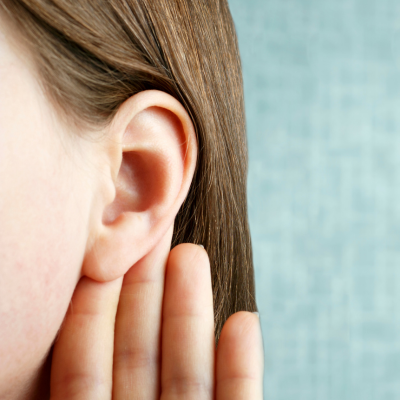
Hypoacusis in women: omega-3s reduce the risk of hearing loss by 20%

A U.S. study suggests the effectiveness of Omega 3 fish in preventing hearing loss in women. The supporting evidence is not lacking and extends the possibility of reducing the risk of hearing loss in men as well.
In women, consumption of two or more servings per week of any type of fish was associated with a 20 percent reduction in the risk of hearing loss. Not only that, a higher intake of Omega 3, the anti-inflammatory fats in which fish are rich, is also inversely associated with the risk of hearing loss. This is the finding of a study conducted at Brigham and Women's Hospital in Boston, USA, and published in the pages of the American Journal of Clinical Nutrition.
Hypacusis buys: a common problem
Progressive hearing loss is widespread in adults, and it is a chronic and often disabling health condition. Although acquired hearing loss is often considered an inevitable aspect of aging, identification of the various potentially modifiable risk factors could provide new information on the possibility of preventing or delaying its onset.
Some scientific evidence suggests that a higher intake of fish rich in Omega-3 may be associated with a lower risk of hearing loss. However, at the time of the study in question, there was still little information in this regard.
Two servings of fish per week reduce the risk of deafness
The authors of the analysis published in the American Journal of Clinical Nutrition examined the association between the risk of hearing loss and total fish consumption, that of different seafood products (tuna, white fish, blue fish, shellfish), and intake levels of long-chain omega-3 fatty acids in 65,215 American nurses involved between 1991 and 2009 in the Nurses' Health Study II. The necessary information was obtained by filling out specific questionnaires.
At the end of data collection, 11,606 cases of hearing loss were identified. Compared with women who had rarely consumed fish, those who ate two or more servings of fish per week showed a 20 percent reduced risk of hearing loss, regardless of the type of fish chosen. Similarly, intake of higher doses of Omega 3 was inversely associated with the risk of hearing loss.
The supporting studies
Prior to this, another study had associated fish and Omega 3 consumption with reduced risk of aging-associated hearing loss: an investigation published in 2010, also in the American Journal of Clinical Nutrition, by Bamini Gopinath and colleagues at the University of Sydney, Australia.
Gopinath and colleagues had found an inverse association between the intake of long-chain omega-3s (such as eicosapentaenoic acid - EPA - and docosahexaenoic acid - DHA - from mackerel and anchovies) and the incidence of hearing loss. Specifically, their analysis had shown that participants who ate at least 2 servings of fish per week had a 42 percent lower risk of age-associated hearing loss than those who ate less than 1 serving per week.
Gopinath and colleagues also found an association between eating at least 1 and less than 2 servings of fish per week and reduced risk of worsening hearing loss. In contrast, another study, published by Lauren Dillard et al. in the Journal of Speech, Language, and Hearing Research, associated hearing loss with higher consumption of trans fat and, in the case of women, saturated fat.
The possible protective mechanisms
The protective mechanism underlying the associations found in these studies is likely mediated by the positive effects that Omega-3 exerts on blood microcirculation within the cochlea, a component of the inner ear, and on local nutrient supply.
In addition, a series of experiments conducted in animal models suggests that the anti-inflammatory action exerted by Omega 3 may come into play. In mice, aging is associated with an increase in inflammatory molecules, which, however, can be prevented by taking Omega 3 supplements, and taking the supplements is associated with improvement in parameters used to assess hearing.
Can hearing loss be limited with nutrition?
The evidence supports the hypothesis that diet may influence the risk of acquired hearing loss, which typically occurs with advancing age. In particular, higher intakes of omega-3 fatty acids and higher fish consumption could reduce the risk of hearing loss.
Further studies will allow the benefits of Omega 3 for hearing to be confirmed. At present, the idea of preventing hearing loss through a dietary approach based on increasing Omega 3 intake certainly looks like a practical and innovative strategy.
Bibliographic references:
Curhan SG, Eavey RD, Wang M, Rimm EB, Curhan GC. Fish and fatty acid consumption and the risk of hearing loss in women. Am J Clin Nutr. 2014 Nov;100(5):1371-7. doi: 10.3945/ajcn.114.091819
Dillard LK, Nelson-Bakkum E, Schultz A, Merten N, Malecki K. Associations of Dietary Intake With Self-Reported Hearing Loss: Findings From the Survey of the Health of Wisconsin. J Speech Lang Hear Res. 2023 Jul 12;66(7):2478-2489. doi: 10.1044/2023_JSLHR-22-00473
Fiorini AC, Costa OA Filho, Scorza FA. Can you hear me now? The quest for better guidance on omega-3 fatty acid consumption to combat hearing loss. Clinics (Sao Paulo). 2016 Aug;71(8):420-2. doi: 10.6061/clinics/2016(08)01
Gopinath B, Flood VM, Rochtchina E, McMahon CM, Mitchell P. Consumption of omega-3 fatty acids and fish and risk of age-related hearing loss. Am J Clin Nutr. 2010 Aug;92(2):416-21. doi: 10.3945/ajcn.2010.29370
Martínez-Vega R, Partearroyo T, Vallecillo N, Varela-Moreiras G, Pajares MA, Varela-Nieto I. Long-term omega-3 fatty acid supplementation prevents expression changes in cochlear homocysteine metabolism and ameliorates progressive hearing loss in C57BL/6J mice. J Nutr Biochem. 2015 Dec;26(12):1424-33. doi: 10.1016/j.jnutbio.2015.07.011





